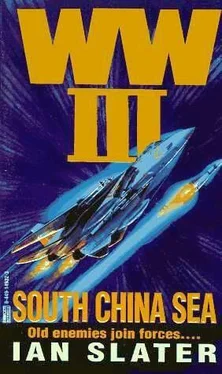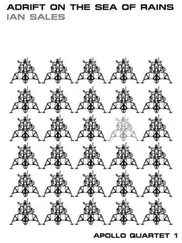He decided he’d work for one of the joint U.S.-Chinese oil exploration companies operating in the Spratly Islands. Big pay and warmth. His wife wasn’t happy, but he promised her he’d stick with it for only a year.
And so it was, that like the American in the 1930s who had decided to escape a depression-racked America for a more simple, peaceful life on a South Sea island called Guadalcanal, Danny Mellin chose to work in the tropics on a drill ship in the South China Sea. No heavy gear to wear over there. “Hell,” he told friends, “all you’d need is your hard hat, a pair of swim shorts, and suntan lotion. Paradise.”
South China Sea
Beneath a tropical copper sky, day was ending, a current of heavy swells coming down south from Palawan Island in the southern Philippines, curving westward through the Spratly Islands and on over 1,800 kilometers across the South China Sea, toward the lush green coast of Vietnam.
The drill ship, a half-Chinese, half-Californian oil venture, the MV Chical 1, known to its crew as simply Chical, rose and fell with the swells. Her antiroll tanks minimized the pitch and yaw of the ship so that her drill rig would remain as perpendicular to the sea’s surface as possible, the drill column going straight down through the moon pool where the Chical’s interior midships was open to the sea like a huge, bright, floodlit swimming pool.
Down below there was the mystery of the coral reef and sedimentary layers as yet unexplored by the drill. They might hold treasure, if the profile gained by seismic shots was promising. Explosions of sound sent down to penetrate the subsurface layers reverberated back from folds or fault lines along which oil may have pooled or natural gas been enclosed. If the drill ship, as opposed to a drill platform, didn’t find oil over one reef, it could sail on to the next site amid the archipelago’s more than two hundred reefs, cays, and tiny islands. What the Chical lost in the stability of a fixed platform, it gained in more seabed covered.
It was purely by chance that one of the Chinese roughnecks working on the weather deck amid the forward port-quarter pipe rack saw the junk, the Ling Chow, in the fading copper sea. But he couldn’t claim credit for seeing its flag— Vietnamese, a yellow star on a blood-red background — which was flying upside down, the universal distress signal, which meant its radio must be down, or perhaps it had none. The man who first recognized that the flag was upside down — two of the star’s five points on the bottom instead of at the top— was Danny Mellin, working a hundred feet high from a monkey board and safety harness up by the derrick man’s console and upper racking arm and carriage.
Danny pulled out his walkie-talkie, its aerial snagged for a moment in a strap of his Mae West, and told the pilothouse where Chical’s Chinese captain could get a fix on the damaged junk. The Chical’s captain, seeing the junk’s minisail shredded, ordered several Chinese and American roustabouts to go starboard amidship to lend a hand bringing the junk alongside. Of course, there was always a risk involved in the South China Sea, infested by modern-day pirates who, among other outrages, had preyed so mercilessly on the Vietnamese boat people trying to escape. While the Chical helped the Ling Chow, drilling would have to be suspended for a while as the extra pitch and roll of the disabled junk, its bamboo sail battens or stiffeners creaking in the wind, would only add to the swells, sloshing against Chical’s starboard side.
The sick man they brought aboard the MV Chical was strapped down but nevertheless thrashing about in great pain, his face drenched in sweat. He jabbered incomprehensibly in a Vietnamese-Chinese border dialect, and the first aid man aboard the drill ship, a roughneck called Perowitz from New Jersey, was sent to have a look-see to calm him down. Apart from possible fever — Perowitz pressed the automatic thermometer’s green button and stuck it in the crewman’s mouth — there seemed to be no serious internal problems. Perowitz asked the man what he’d eaten, and his fellow seaman said some rice and fish. Had the rest of the junk’s crew eaten the same?
“Yes,” a man who seemed to understand a bit of English replied.
And had they all had something to drink? “I mean, drinking the same stuff?” Perowitz pressed.
One of the men who set the stretcher on the drill ship’s deck nodded urgently. “Yes, yes, Tsing Tao.” It was the Chinese beer that everyone drank on the Chical as well.
So the best Perowitz could suggest, seeing how much pain the man was in — the man indicating a lot of gas, his hands arcing over his belly in the shape of a huge balloon — was perhaps a good shot of Pepto-Bismol. A couple of minutes after he had given the man the dose, it looked as if it was working.
“Ah, you’ve got a bellyful of gas — that’s all.”
Unknowing brown faces looked at him in the twilight
“You know,” Perowitz said, now in a pantomime mode. “Gas!”
“You drill for?” one of the junk crew said.
“What?” Perowitz laughed. “No, no — not gas like we drill for. You know — uh, fart!”
They were still looking blankly at him when he bent forward and made a fart noise with his mouth. Their immediate recognition was hailed with raucous laughter and a splash off the stem. Mellin could hear the splash from high up near the derrick man’s console, since they had stopped drilling. He radioed down to the well deck foreman. “Hey, Randy?”
“Yeah?”
“Somebody threw something over. You tell those junk boys not to dump any of their garbage. Could get caught up in our gear under the moon pool.”
“You got it,” the deckhand said, and made his way over to the Chical’s starboard side.
Only one or two of the dim figures he called out to understood what he meant, and the captain of the junk said it wouldn’t happen again. “Sorry.” And that impressed several of the Caucasian crew aboard Chical, because they’d always believed Asians usually couldn’t handle the r sound. At that moment oil began rushing up, spilling out like a fine spray as if it was a signal — when in fact it was pure coincidence. The rickety bamboo gangway leading to the Chical was suddenly covered in crew from the junk, and Perowitz fell — shot through the head — the crew from the junk running past his body, the twilight spiked by the barrels of their AK-74s.
The first stutter heard by Mellin came from the radio shack just aft of the wheelhouse. The operator, another American, was dead even before his bullet-riddled body hit the deck. His blood made the decking slippery for those who quickly ran to the pilothouse, spraying its glass. Then he finished off the three men on watch once inside. One of the junk men’s AK-74s jammed as the Chical’s captain, revolver in hand, emerged from his cabin aft of the port side of the wheelhouse. He got one shot away, hitting an attacker, who fell while another brought a short broadsword down hard and fast in a sweep, disemboweling the captain.
Even with all the noise going on, the engine room crew of the Chical didn’t hear a thing, the chief engineer checking the generating room gauges and making sure the tension on the stabilizer anchor chains wasn’t excessive, the chains helping to hold the ship as near one spot as possible. The first engine room man to know anything was wrong was a Virginian, Gary Sales. Having just emerged from a forward hatch onto the well deck, he was struck on the head by a short broadsword, as the captain had been. It split his skull, his grayish brain oozing out beneath the bright deck lights as his body slumped and fell back down to the generating room with a sickening thud.
Читать дальше












